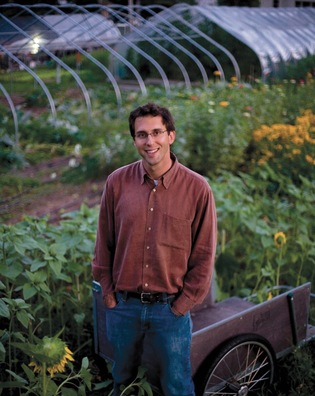 loading
loading
MilestonesThe rapid rise of slow food Julie BrownJosh Viertel is moving on after helping to spark a new way of eating at Yale. View full image
Most college kids on their way to a party might pick up a six-pack of beer. But if you had been at Harvard in 2000, you might have run into Josh Viertel heading out for the night with a bundle of radishes in hand. For the past six years, Josh Viertel has run the Yale Sustainable Food Project—the first of its kind in the country—as co-director and co-founder. Viertel helped transform a small student group into a university-funded organization that promotes environmentally sound eating on campus. YSFP runs conferences and events, encourages curricular offerings (Yale now has a concentration in food and agriculture within the environmental studies major), and runs a one-acre sustainable farm on Science Hill. (See Scene on Campus.) But most striking is the project's impact on Yale's dining halls: now, instead of french fries and chicken strips, you might find honey-glazed turnips and free-range-chicken breast, all produced on sustainable farms. Viertel's efforts have not gone unnoticed. Last month, he was snapped up by Slow Food USA, an international advocacy group for fair and sustainable food, to be its new president. His co-director at the YSFP, Melina Shannon-DiPietro, will continue as director. For Viertel, the experience of working together is what has made the Yale project successful. "Experience is at least as important as rhetoric," he says. "Shared work and shared food speak for themselves." But Viertel adds that the job isn't over at Yale. Though 40 percent of the food in the dining halls is sustainably produced, Viertel believes it should be 100 percent: "The right thing isn't something you do part way."
The comment period has expired.
|
|